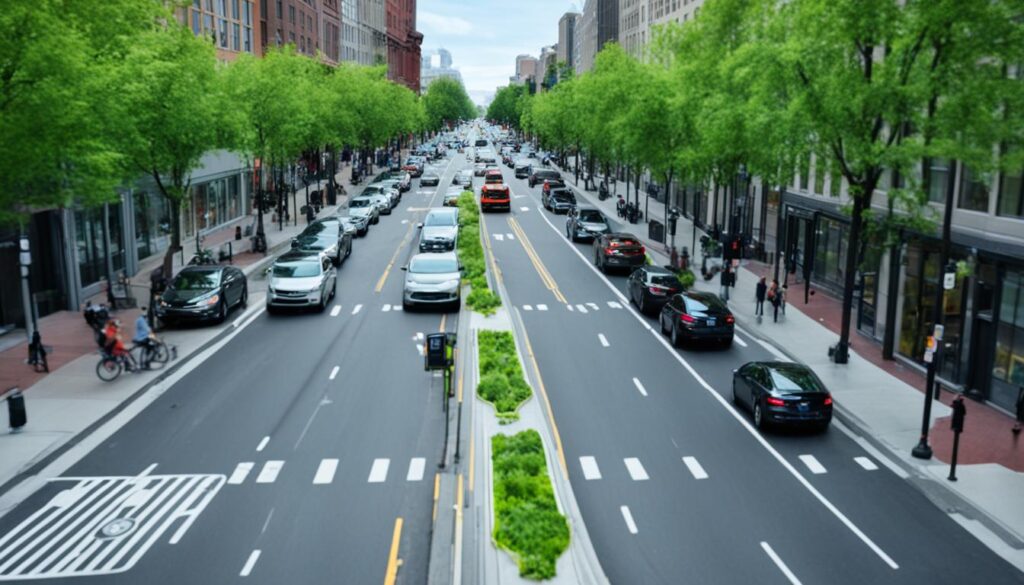In this section, we will explore practical eco-friendly tips that can help nurture a healthier environment and promote sustainability. By embracing greener living practices, we can pave the way for a better tomorrow.
Reduce Energy Consumption
Reducing energy consumption is not only an effective way to save on utility bills, but it also plays a crucial role in preserving our environment. By implementing simple energy-saving tips, both households and businesses can contribute to a greener future.
Energy-Saving Tips for Homes
When it comes to reducing energy consumption at home, small changes can make a big difference. Here are a few tips to help you get started:
- Optimize your thermostat: Set your thermostat to a comfortable temperature and consider utilizing programmable thermostats to adjust the temperature automatically when you’re away from home.
- Unplug idle electronics: Electronics such as chargers, televisions, and computers continue to draw energy when plugged in, even when not in use. Be sure to unplug them or use power strips to easily turn them off.
- Upgrade to energy-efficient appliances: When replacing old appliances, opt for energy-efficient models with the ENERGY STAR label. These appliances are designed to consume less power while maintaining high performance.
- Switch to LED lighting: LED light bulbs are not only more energy-efficient but also last longer than traditional incandescent bulbs. Consider replacing outdated bulbs with LED alternatives to reduce energy consumption.
Energy-Saving Tips for Businesses
Businesses can also play a significant role in reducing energy consumption. Here are some energy-saving tips for commercial establishments:
- Conduct an energy audit: Identify areas of energy waste in your business by conducting an energy audit. This will help you determine where improvements can be made to reduce energy consumption.
- Implement energy-efficient lighting: Switch to LED or fluorescent lighting options throughout your establishment. These options are not only more energy-efficient but also provide improved lighting quality.
- Invest in energy-efficient equipment: When upgrading equipment, choose energy-efficient options that consume less power without compromising performance.
- Encourage employee participation: Educate and engage employees about energy-saving practices such as turning off lights when leaving a room, using natural light when possible, and properly maintaining equipment.
By implementing these energy-saving tips, both households and businesses can reduce their energy consumption and contribute to a more sustainable future.

Minimize Waste Generation
Minimizing waste generation is a crucial step towards creating a sustainable and eco-friendly environment. By adopting waste reduction strategies, we can significantly reduce our environmental impact and contribute to a healthier planet.
To minimize waste, one of the most effective steps we can take is to reduce the use of single-use plastics. These plastics, such as straws, bags, and bottles, contribute to a large portion of waste that ends up in landfills and our oceans. Instead, opt for reusable alternatives like metal or glass containers, cloth bags, and metal or bamboo straws.
Another important aspect of waste reduction is promoting recycling. Ensure that you have separate recycling bins for paper, plastic, glass, and metal, and educate yourself and others on what can and cannot be recycled. By recycling items, we can reduce the need for raw materials extraction and conserve energy.
In addition to recycling, composting is another effective strategy for minimizing waste. By collecting and composting organic waste, such as food scraps and yard trimmings, we can reduce the amount of waste sent to landfills and create nutrient-rich soil for gardening and farming.
Lastly, consider embracing the concept of minimalism and conscious consumerism. By buying only what we need and choosing products with eco-friendly packaging, we can significantly reduce waste generation. Opt for products that are made from sustainable materials and support brands that prioritize waste reduction and environmental responsibility.
By implementing these waste reduction strategies in our daily lives, we can make a significant impact in minimizing waste generation and preserving our environment for future generations.
Embrace Sustainable Transportation
When it comes to nurturing a healthier environment and promoting sustainability, the importance of sustainable transportation and eco-friendly commuting options cannot be overstated. By reducing our reliance on traditional fuel-powered vehicles, we can significantly decrease carbon emissions and contribute to a cleaner future for our planet.
One of the key alternatives to consider is electric cars. With advancements in technology and the availability of charging infrastructure, electric vehicles (EVs) have become a viable and eco-friendly option for commuting. They produce zero tailpipe emissions and offer a sustainable transportation solution that greatly reduces our carbon footprint.
Electric Cars: A Green Driving Choice
Electric cars have multiple advantages when it comes to sustainability. They help reduce air pollution, decrease reliance on fossil fuels, and effectively contribute to lower greenhouse gas emissions. By adopting electric cars, we not only support a greener future but also enjoy long-term benefits such as lower fuel costs and reduced maintenance expenses.
To further encourage eco-friendly commuting, public transportation systems play a vital role. By utilizing buses, trams, trains, or light rail services, we can significantly reduce the number of individual vehicles on the road, easing congestion and lowering emissions. Public transportation is a more sustainable option as it efficiently transports a large number of passengers, leading to reduced traffic-related environmental impacts.
In addition to electric cars and public transportation, cycling and walking are also sustainable transportation options worth considering. By using human-powered methods of commuting, we decrease reliance on motorized vehicles, reduce traffic congestion, and promote physical activity. Cycling and walking contribute to healthier lifestyles while simultaneously being gentle on the environment.
Embracing sustainable transportation and eco-friendly commuting options is a crucial step towards creating a more sustainable future. By reducing carbon emissions, we contribute to mitigating climate change and preserving the well-being of our planet for generations to come.

Promote Water Conservation
Water conservation is crucial for maintaining a healthier environment and ensuring the sustainable usage of this precious resource. By making conscious choices in our daily lives, we can contribute to the preservation of water and promote a greener future. Here are some practical tips to help you promote water conservation:
Mindful Water Usage
Being mindful of our water usage is the first step towards conservation. Simple practices like turning off the tap while brushing your teeth, taking shorter showers, and fixing leaky faucets can significantly reduce water wastage.
Implement Water-Saving Technologies
Incorporating water-saving technologies into our homes can make a meaningful difference in our water consumption. Consider installing low-flow showerheads, faucets, and toilets to minimize water usage without compromising comfort or functionality.

Collect and Reuse Rainwater
Utilizing rainwater for gardening and other non-potable purposes is an effective way to conserve water. Rain barrels or tanks can be installed to collect rainwater, reducing the strain on municipal water supplies.
Choose Drought-Tolerant Plants
Opting for drought-tolerant plants in your garden or landscaping can significantly reduce the need for excessive watering. These plants are well-adapted to arid conditions and require less maintenance, saving both water and effort.
Manage Irrigation Wisely
If you have a garden or lawn, make sure to use your irrigation system thoughtfully. Water your plants during the cooler parts of the day, such as early morning or late evening, to minimize evaporation. Additionally, consider installing a smart irrigation controller that adjusts watering schedules based on weather conditions and plant needs.
Spread Awareness
Educate others about the importance of water conservation and encourage them to adopt sustainable water usage practices. Small actions can create a ripple effect, leading to more significant changes and a collective effort to preserve our water resources.
Adopt Sustainable Agriculture
Adopting sustainable agriculture practices is crucial for environmental preservation. By promoting organic farming practices and implementing regenerative farming methods, we can contribute to a more sustainable and eco-friendly food system.
Organic farming, in particular, focuses on cultivating crops and raising livestock without the use of synthetic fertilizers, pesticides, or genetically modified organisms (GMOs). Instead, it emphasizes the use of natural methods and resources to maintain soil health and biodiversity.
Regenerative farming methods go even further by implementing practices that restore and enhance the health of the soil, water, and ecosystems. This includes techniques like cover cropping, crop rotation, and diversified plantings to reduce soil erosion, enhance nutrient cycling, and promote overall resilience.
By adopting sustainable agriculture practices, we can minimize the environmental impact of conventional farming methods, such as soil degradation, water pollution, and greenhouse gas emissions. Moreover, sustainable agriculture supports the production of local and seasonal produce, reducing the need for long-distance transportation and preserving the freshness and nutritional value of the food we consume.
Embracing sustainable agriculture is not just essential for environmental preservation; it also promotes healthier ecosystems and contributes to the vitality of local communities. By supporting farmers who prioritize sustainable practices, consumers can play a significant role in creating a more sustainable and resilient food system.
Conclusion
In conclusion, implementing these eco-friendly tips can make a significant impact on nurturing a healthier environment and promoting sustainability. By reducing energy consumption, we can minimize our carbon footprint and decrease our reliance on non-renewable resources. Energy-saving practices, such as switching to LED lighting, using energy-efficient appliances, and properly insulating our homes, can lead to long-term energy savings and a greener future.
Furthermore, minimizing waste generation is crucial for environmental preservation. By adopting a circular economy mindset and following waste reduction strategies, such as avoiding single-use plastics, recycling, and composting, we can reduce pollution and conserve valuable resources. These small changes in our daily lives can collectively have a significant positive impact on the planet.
Embracing sustainable transportation options is another vital step towards a greener future. By choosing eco-friendly commuting methods like walking, cycling, or using public transportation, we can reduce traffic congestion and carbon emissions. Additionally, promoting carpooling and investing in electric vehicles further contribute to preserving our environment and improving air quality.
Promoting water conservation practices is essential due to the increasing strain on water resources. By implementing water-saving technologies like efficient irrigation systems, using rainwater harvesting methods, and being mindful of our water usage, we can preserve this precious resource for future generations. Access to clean water is a fundamental right, and every effort we make to conserve water can have substantial positive effects.
Lastly, adopting sustainable agriculture methods is crucial for a sustainable and eco-friendly food system. By supporting organic farming practices, regenerative farming, and consuming local and seasonal produce, we can reduce the use of harmful chemicals, protect biodiversity, and support local communities. Sustainable agriculture not only benefits the environment but also promotes healthier food choices for individuals and strengthens food security.
By integrating these eco-friendly practices into our daily lives, we collectively contribute to a greener and more sustainable future. Every small action matters, and together, we can create a healthier environment for ourselves and future generations to enjoy.
